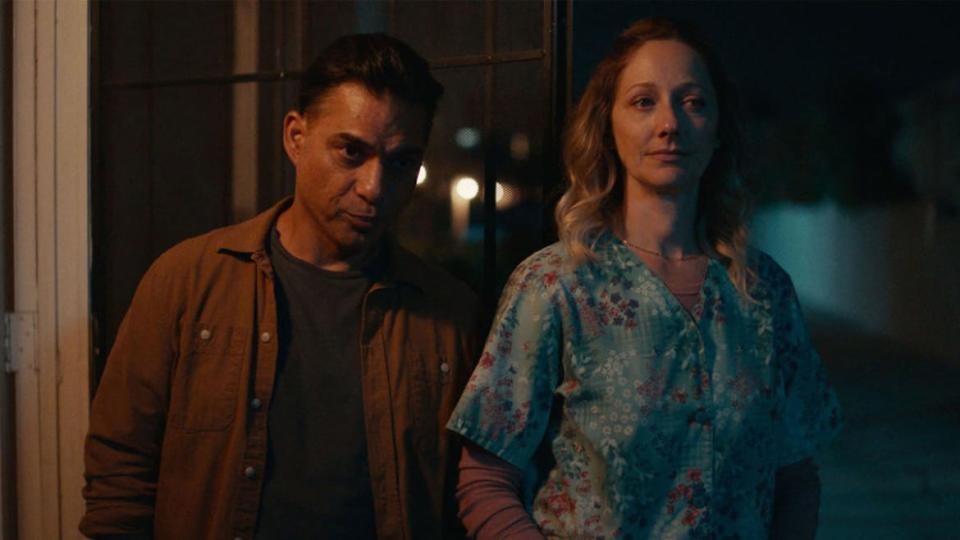‘Aporia’: Judy Greer, Queen of Saving Mediocre Movies, Strikes Again

- Oops!Something went wrong.Please try again later.
Judy Greer is no stranger to skirting the conventions of the typical time travel movie. Before starring in writer and director Jared Moshe’s Aporia, in theaters this weekend, the star had done that twice already.
Greer’s role as Hollywood’s most famous character actress means that she has traversed into just about every genre under the sun—and done it multiple times. Aporia is her third time-bending venture, and certainly her most substantive. That’s not really a tall order, given that she was almost entirely cut out of 2015’s Tomorrowland, and her role in 13 Going on 30 (though renowned) didn’t give the actress much space to give anything more layered than the archetypal high-powered publishing super-biotch. But Greer has always made a meal out of a morsel, and in Aporia, she is not scrounging for scraps by any means.
In the film, Greer plays Sophie, a grieving widow who lost her husband, Malcolm (Edi Gathegi), in a drunk-driving accident, leaving Sophie and their daughter, Riley (Faithe Herman), achingly distant as they battle their pain.
When Sophie comes upon a machine that can change the course of her current life and end her family’s misery by killing someone else in the past, she reluctantly feels she has nothing more to lose. And though Aporia has little in the way of originality or style, Moshe’s screenplay benefits from its focus, never reaching for too many lofty answers about the human condition. But it’s Greer who shines the brightest; amidst all of Sophie’s turmoil, Greer delivers a tender and relatable performance that opts for modesty over histrionics. It might just be her best dramatic performance yet.
The science of the machine that Aporia revolves around is murky at best, which some genre enthusiasts may find a detriment. But time travel—or, in this case, sending a gunshot-like burst of matter back through time via calculated coordinates—is not exactly a real and proven science in the first place. These films demand the suspension of disbelief, and for what it’s worth, Aporia’s way into its science fiction element seems distinctly plausible (at least to this writer, who got a C in high school physics).
Malcolm’s best friend Jabir (Payman Maadi), whom Malcolm bonded with over their mutual love of physics and engineering, offers Sophie a way out of her grief. His solution is a machine he says can essentially “fire a bullet into the past.” Malcolm, who came to America as a refugee after his own family was killed, understands the unique pain that Sophie is feeling, but has been too apprehensive to use it to cure his own grief. He extends the machine’s power to Sophie, who first refuses, before succumbing to her heartache by pushing one little button.
‘Red, White & Royal Blue’ Finally Lets Gays Be Really Freakin’ Dumb in a Movie
Before any matters of space and time come into the picture, Greer is already commanding the film. Her expressions carry a heaviness that reflects the immenseness of Sophie’s loss and gives Aporia its necessary layer of believability, even when the film’s science-fiction component starts to falter. Malcolm does indeed come back to her, but while their reunion is emotional, it’s also burdened by the viewer’s suspicion that something very annoying is about to happen.
The effects of time travel on reality are a necessary component for any writer to examine when developing a film like this, but can typically be the most exasperating aspect. Ripples happen, people forget parts of their lives, things go missing, world and personal histories become worse—you get the picture. Having set itself up with an interesting skew on the genre, Aporia could easily lose all of that good faith with some obnoxious over-examination of the repercussions of Malcolm’s return. Instead, the movie studies the moral quandaries that arise between Sophie, Malcolm, and Jabir when Malcolm must eventually be told what happened to him.

As any of us might when given the chance to thrust a burst of matter into someone’s brain, somewhere in the past, the film’s core triad gets mixed up in how they might be able to change the world. But keeping with the film’s tight focus, they only are concerned with being able to correct the misfortune that surrounds them. Could there really be any harm in stopping a school shooter from causing mass tragedy? Certainly not, but the answer is far less simple when it comes to Sophie’s zeal for helping the widow of the drunk driver she killed by bringing Malcolm back.
Aporia finds just enough edge in the fallout from Malcolm’s return to keep its slightly overlong runtime from being a burden. Moshe carefully deals with the logistics of human virtue and the increasingly crushing weight of Sophie’s morality. Because of that, Aporia settles itself nicely beside films like Safety Not Guaranteed and About Time, which are both similarly understated. It’s a quieter entry into the genre, but the emotions are much more powerful when they aren’t clouded by schematics and unnecessary scientific dialogue.

Though Gathegi and Maadi make for a realistically warm best-friend dynamic, it’s Greer who carries Aporia through its slumps. She knows when to dial her performance back so Sophie doesn’t become a caricature of a grieving widow, and when to push the strain of her guilt to the front. That remorse, paired with Sophie’s refusal to let Malcolm go again, creates a potent push and pull that contrasts against Moshe’s flat directing.
Aporia has virtually zero distinct style, but its lack of any visual flair isn’t a hindrance purely because of Greer's ability to command the frame. It’s because of her that the film transforms itself into something absorbing, even if its modest time travel story may be a little too planted in reality to make any significant change.
Liked this review? Sign up to get our weekly See Skip newsletter every Tuesday and find out what new shows and movies are worth watching, and which aren’t.
Get the Daily Beast's biggest scoops and scandals delivered right to your inbox. Sign up now.
Stay informed and gain unlimited access to the Daily Beast's unmatched reporting. Subscribe now.

